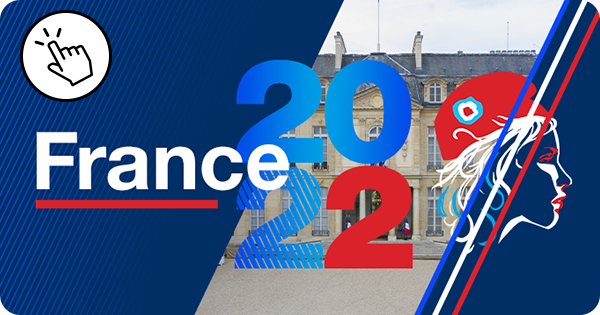Could France be facing its Trump moment? For US commentators, France’s presidential runoff between Emmanuel Macron and Marine Le Pen has raised the prospect of a fresh shakeup in transatlantic alliances, which could test Western unity against Putin’s Russia as war rages in Ukraine.
As of late Sunday evening, Washington, DC time, the outcome of France’s first round of presidential voting was all but certain: incumbent Emmanuel Macron will face the far-right's Marine Le Pen in a rematch of their 2017 run-off election. And this time around, the numbers suggest that Le Pen is well within reach of the Élysée Palace, with two of the latest polls putting her at 49 points to Macron’s 51 in the second round of voting on April 24.
The election has “exposed seismic shifts in France’s political culture”, wrote Vox’s Ellen Ioanes, in an article that topped the outlet’s homepage on Sunday evening.
“I’ve never seen an election change as quickly as this one has,” Mabel Berezin, director of Cornell University’s Institute for European Studies, told Vox.
For many in the anglophone world, Le Pen’s resurgence has raised the spectre of 2016, when the Brexit referendum and Donald Trump’s election shook up the world order. Since then, liberal and progressive candidates from the US’s Joe Biden to Germany’s Olaf Scholz have regained the upper hand. But the prospect of a Le Pen win in France serves as a reminder that the battle between liberal democrats and right-wing populists remains far from settled.
“A Le Pen victory in the second round would mark the first far-right presidency in French history,” wrote the Washington Post’s Rick Noack. “It would also upend politics in Europe – replacing the most fervent advocate of European Union cooperation with someone known for anti-E.U. rhetoric, and giving an official platform to the far-right at a time when nationalists in many other European countries have been struggling.”
Transatlantic alliances at stake
So far, the official reaction from Washington has been muted.
“The official position for now from the White House is that the US does not comment on foreign elections until they have the final result,” said FRANCE 24’s White House correspondent Kethevane Gorjestani. “But they did reiterate the fact that they saw France as really a key ally.”
That alliance could be tested if Le Pen wins in two weeks – something several US analysts highlighted on Sunday.
“An anti-NATO and more pro-Russia France in the event of a Le Pen victory would cause deep concern in allied capitals, and could fracture the united trans-Atlantic response to the Russian invasion of Ukraine,” wrote the New York Times’ Roger Cohen.
At first, the war in Ukraine appeared to play in Macron’s favour, burnishing his image as a global statesman and damaging the credibility of his leading opponent. Scrutiny of Le Pen’s past ties to Russian President Vladimir Putin put her on the defensive. Multiple US outlets highlighted reports that Le Pen’s campaign in early March scrapped more than a million leaflets that pictured her shaking hands with the Russian president.
For CNN European affairs commentator Dominic Thomas, this will remain a sore spot for her heading into the second round.
“She will have difficulty convincing the electorate of her foreign policy credentials, especially given her longstanding links with Russia,” Thomas said.
But other analysts worry that Macron’s attention to the Ukraine crisis – at the expense of campaigning – could backfire.
“It would be terrible for the western alliance if Macron prioritising Ukraine and his duties as President at the expense of the campaign and his interests as candidate contributed to handing Putin a strategic win with the election of Le Pen,” wrote New York-based Ben Judah, senior fellow at the Atlantic Council, on Twitter last Monday.
It would be terrible for the western alliance if Macron prioritising Ukraine and his duties as President at the expense of the campaign and his interests as candidate contributed to handing Putin a strategic win with the election of Le Pen: https://t.co/9we7B47eoX
— Ben Judah (@b_judah) April 4, 2022
Inflation threatens incumbents on both sides of the Atlantic
The war in Ukraine has also compounded an issue that Le Pen has wielded deftly against Macron in recent weeks: inflation.
“National Rally leader Le Pen, in a late surge, tapped into the foremost issue on many French voters’ minds: soaring costs for food, gas and heating due to rising inflation and the repercussions of Western sanctions on Russia,” noted the Associated Press.
Across the French economy, prices were up 4.5 percent in March compared to a year earlier, according to the national statistical institute Insee. Energy prices were up a staggering 28.9 percent. Le Pen argues that further tightening sanctions on Russia will only make matters worse.
Cutting off Russian oil and gas imports would be “a tragedy for French families,” she told French radio station RTL (as reported in English by Politico). “I’m sorry to tell you, my priority is to defend the purchasing power of French families.”
This issue, too, has its echoes across the Atlantic. The US, as the world’s largest oil and gas producer, remains more sheltered than Europe from spiking energy prices. But that hasn’t stopped Republicans from hammering Democrats over what they call “Bidenflation”, as polls show the rising cost of living to be a top concern for voters ahead of November’s midterms.
The French election may remain in the background of most US news coverage for now. But if, in two weeks, Le Pen remains within striking distance of the Élysée, there is no doubt that Washington will be watching.








